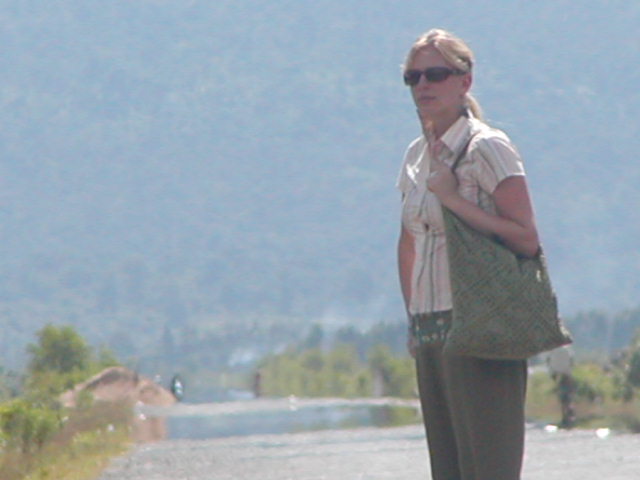
The Cambodian’s have certainly got one thing right: selling a country is like selling a house, first impressions count for everything. Since tourism is now the number one economy booster, they make sure their valued foreign guests are greeted in style. The airport is positively gleaming, highly polished tiles, soft music and amazingly efficient baggage handlers that make Heathrow look like a scummy bus station in Rotherham.
Jumping into a tuk-tuk and making the journey into the city reveals a different story as dusty, grimy streets hopping with activity lay this fascinating nation bare. Phnom Penh is a city of contradiction
 s. Where muddy dirt tracks; strewn with garbage and littered with noodle stalls lead to vast 4 lane boulevards lined with blossoming trees and huge colonial mansions. Where a family of 6 cling on to a clapped out motorbike, struggling to maintain balance as a boisterous American 4x4 land cruiser whooshes by. Where a Buddhist monk; clad in sunset orange robes glides serenely down the riverside, passing grubby little street kids hustling the tourists for a buck.
s. Where muddy dirt tracks; strewn with garbage and littered with noodle stalls lead to vast 4 lane boulevards lined with blossoming trees and huge colonial mansions. Where a family of 6 cling on to a clapped out motorbike, struggling to maintain balance as a boisterous American 4x4 land cruiser whooshes by. Where a Buddhist monk; clad in sunset orange robes glides serenely down the riverside, passing grubby little street kids hustling the tourists for a buck.Phnom Penh was exactly as I left it 8 months ago if not a little cooler and a lot rainier. But I had chosen not to remember the development, the symbols of the West ever present, from the $ bills that fill my purse, to the impressive shopping mall complete with balsamic vinegar and marmite selling supermarket. I don’t know why I chose only to remember the poverty, but the stunning colonial architecture and of course the marmite were a welcomed addition. This capital city is both charming and endearing and the lack of public transport systems, sky scrapers, Starbucks and McDonalds (can you believe it?!) make it feel like a small village with a big attitude. On first impressions, Turbo describes it as rural Thailand 19 years ago, if that’s true, this city has got a long way to go before it reaches Bangkok standards.
I live in a $2 guesthouse by a large lake in backpacker’ ville (re-named rat-packer’ ville, after the fury friend I found in my room last night). It’s actually OK, not too dirty, although after a month of hearing the same backpacker stories about all the places I have already been, I’m ready to get myself a gated apartment complete with guard and iron window bars in the city. Actually P.P is not that dangerous, the gun crime has reduced a lot and as long as your not stupid and walk down dark streets at night, most areas are ok
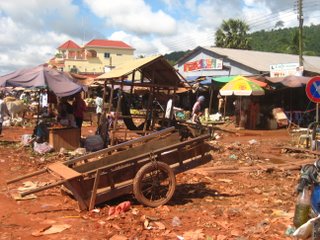 . I haven’t been near any of the slums but my friend who is a volunteer doctor went to visit HIV patients in a big slum area and his stories are horrific. In the governement hospitals, each morning the surgeon team will have more then 50 patients in dire need of treatment, but only 4 people will get seen that day. They do a lottery every morning (i'm not joking) to choose the lucky patient's and the rest will be sent home, many almost certain to a fate of death. Some may have saved up for 6 months to get the money to take a motorbike taxi to Phnom Penh from the provinces, in which time their illness will have got out of control. They will then be sent home untreated. I think we should all stop complaining about the NHS?
. I haven’t been near any of the slums but my friend who is a volunteer doctor went to visit HIV patients in a big slum area and his stories are horrific. In the governement hospitals, each morning the surgeon team will have more then 50 patients in dire need of treatment, but only 4 people will get seen that day. They do a lottery every morning (i'm not joking) to choose the lucky patient's and the rest will be sent home, many almost certain to a fate of death. Some may have saved up for 6 months to get the money to take a motorbike taxi to Phnom Penh from the provinces, in which time their illness will have got out of control. They will then be sent home untreated. I think we should all stop complaining about the NHS?My business will not take me to the slums, and it is absolutely unavoidable everywhere you go in this city: prostitution. As Cambodia experiences massive surge in tourism, Phnom Penh now lies at the heart of sex tourist trade in S.E Asia and most worrying paedophile tourism. But there are many misconceptions about the proliferation of children trafficking and paedophilic behaviour. Child sex tourism remains a very small, hidden market, yet thousands of pre-pubescent girls are trafficked from their villages to the city every year in an extremely lucrative market.
So who is having sex with these young girls?

Prostitution is embedded into most Asian societies, and here in Cambodia, the old tradition of polygamy is kept alive by frequenting the brothels. From what I can gather, the concept of paedophilia just does not exist in the way it does in the West. Yes of course sleeping with small children is certainly considered wrong, but for the 14, 15, 16 year old girls from the villages, they give old men vitality and are considered clean and disease free. In a city where 37% of commercial sex workers are HIV+ (compared to 2% of the total population) the tragic irony is that as HIV prevention increases, the demand for younger and younger girls has ballooned. With a nation of condom haters, these young girls are considered clean, yet the very fact that their bodies are not ready for sex with grown men makes them even more susceptible to contracting fatal STD’s.
I’m working for a local NGO just out of the city that rescues children from commercial sexual exploitation and severe sexual abuse. I work at the head quarters in P.P which is also a shelter for around 24 children, mostly girls aged between 12 and 18. Most have been rescued from brothels where they were locked into “dept bondage” (they must work off the cost of their own purchase) often for up to 2 years. We provide food, lodgings, education, vocational training and trauma counselling for a temporary period (around 6 months) until they can be safely reintegrated back into their communities or provide
 d jobs in garment factories or a place in a more permanent shelter. And this is my biggest worry.
d jobs in garment factories or a place in a more permanent shelter. And this is my biggest worry. What happens to them when they leave?
Most families will tell the authorities that they were tricked into selling their daughter, believing they were going to be domestic servants. But sadly, it is common knowledge that in rural communities where families do not have enough food to feed their children, the sale
 of one daughter (average $150 US depending on how beautiful they are) and the promise of regular income is a sacrifice that is too frequently made. So the reintegration of these girls back into the communities that sold them in the first place is not only distressing but can be extremely dangerous. Trafficking rings are run by Mafioso style groups and often supported by the police and corrupt government officials, so if a girl is rescued before she has paid off her dept; the family will be in great danger and may have to go into hiding. Last year around 100 underage girls were rescued in a huge brothel raid by NGO’s and the UN and placed in shelters all round the city. We got about 50, double our capacity and within 2 days the police and authorities had stolen all the girls back and returned them to the brothels. One of the biggest challenges for trafficking NGO’s is trying to get the police and authorities on their side. It’s not all this corrupt and many of our girls come through the authorities but there are still too many examples of bad practices.
of one daughter (average $150 US depending on how beautiful they are) and the promise of regular income is a sacrifice that is too frequently made. So the reintegration of these girls back into the communities that sold them in the first place is not only distressing but can be extremely dangerous. Trafficking rings are run by Mafioso style groups and often supported by the police and corrupt government officials, so if a girl is rescued before she has paid off her dept; the family will be in great danger and may have to go into hiding. Last year around 100 underage girls were rescued in a huge brothel raid by NGO’s and the UN and placed in shelters all round the city. We got about 50, double our capacity and within 2 days the police and authorities had stolen all the girls back and returned them to the brothels. One of the biggest challenges for trafficking NGO’s is trying to get the police and authorities on their side. It’s not all this corrupt and many of our girls come through the authorities but there are still too many examples of bad practices.As if things couldn’t get worse, there is a massive stigma attached to girls who have lost their virginity before marriage, even if they have been raped. There is a great risk of the girl being shunned by her community and deemed eternally unfit for marriage. And for a nation where women’s rights are at the very bottom of the agenda, marriage is essential for all women’s survival.
Do I feel like I’m involved in a hopeless situation?
Absolutely not. There is so much potential for change and development in Cambodia particularly for women’s rights. Yes, there is a mammoth task ahead, of which corruption and ineffective leadership is creating a huge barrier, but there are also some very good people dedicating their lives to change. Under 30 years ago this country lost ¼ of its population to one of the bloodiest genocides in history, and to this day you will not meet one pers
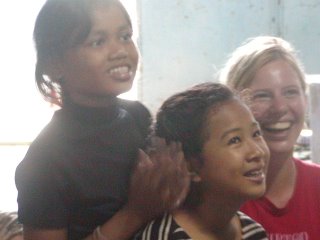 on that wasn’t directly affected by the war. Some say this has created a population that live only for the moment, because they have lost faith in the future. But I have been overwhelmed by the courage and strength of the people I come across, and the warmth they have shown me. The girls I work with have been through the most horrific trauma, yet they battle through daily life with determination and dignity. They support each other and dedicate themselves to learning life skills and education because they know they have to do everything they can to relieve themselves from this situation.
on that wasn’t directly affected by the war. Some say this has created a population that live only for the moment, because they have lost faith in the future. But I have been overwhelmed by the courage and strength of the people I come across, and the warmth they have shown me. The girls I work with have been through the most horrific trauma, yet they battle through daily life with determination and dignity. They support each other and dedicate themselves to learning life skills and education because they know they have to do everything they can to relieve themselves from this situation.When I first arrived, I wondered why the children never got cuddles when they cried, but now I’m beginning to understand. They are no longer children, they don’t have any toys, and I rarely see them play. We have to teach them as much, and as fast as we possibly can to enable them to survive in the harsh world they live. Crying will not help them, they have to be strong. Right now I can hear laughter, and as the girls sit in the classroom, they can learn in a calm and safe environment. Yes it’s temporary, but they now know that they are not completely alone in a hopeless situation. They can see that people do care, and believe they are worth more then their beautiful face. I hope they carry this knowledge with them before they loose all faith in humanity.
Life in post conflict developing societies is harsh. But life for women in post conflict developing societies can be impossible. Women are the protectors of children, and their well-being is fundamental to the development of this country. It isn’t a hopeless situation, and I feel truly blessed for the opportunity to be involved in lives of 24 children that have captured a piece of my heart.

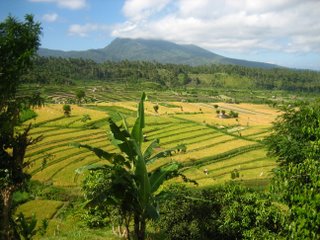
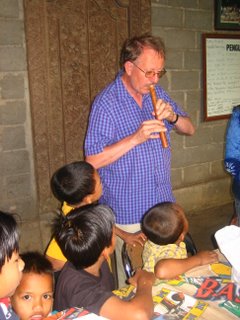 ambodia to work with victims of human trafficking, I found myself surrounded by people all doing amazing work to help others. On the first day that my Dad arrived from England, Robyn from Australia took us to an orphanage that she visits regularly.On the way Robyn bought huge sacks of rice, noodles, fruit and other things needed by the children and also a whole selection of musical instruments for Dad's "percussion workshop". I couldn't help but be moved by the generosity and compassion that she showed these children who had obviously captured a little piece of her heart. Most of the children here are "
ambodia to work with victims of human trafficking, I found myself surrounded by people all doing amazing work to help others. On the first day that my Dad arrived from England, Robyn from Australia took us to an orphanage that she visits regularly.On the way Robyn bought huge sacks of rice, noodles, fruit and other things needed by the children and also a whole selection of musical instruments for Dad's "percussion workshop". I couldn't help but be moved by the generosity and compassion that she showed these children who had obviously captured a little piece of her heart. Most of the children here are "
